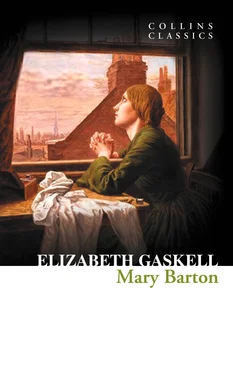While the woman hastily dressed herself, leaving the window still open, she heard the cries of agony, which resounded in the little court in the stillness of the night. In less than five minutes she was standing by Mrs Barton’s bedside, relieving the terrified Mary, who went about where she was told, like an automaton; her eyes tearless, her face calm, though deadly pale, and uttering no sound, except when her teeth chattered for very nervousness.
The cries grew worse.
The doctor was very long in hearing the repeated rings at his night-bell, and still longer in understanding who it was that made this sudden call upon his services; and then he begged Barton just to wait while he dressed himself, in order that no time might be lost in finding the court and house. Barton absolutely stamped with impatience, outside the doctor’s door, before he came down; and walked so fast homewards, that the medical man several times asked him to go slower.
‘Is she so very bad?’ asked he.
‘Worse, much worser than I ever saw her before,’ replied John.
No! she was not – she was at peace. The cries were still for ever. John had no time for listening. He opened the latched door, stayed not to light a candle for the mere ceremony of showing his companion up the stairs, so well known to himself; but, in two minutes, was in the room, where lay the dead wife, whom he had loved with all the power of his strong heart. The doctor stumbled upstairs by the fire-light, and met the awestruck look of the neighbour, which at once told him the state of things. The room was still, as he, with habitual tiptoe step, approached the poor frail body, that nothing now could more disturb. Her daughter knelt by the bed-side, her face buried in the clothes, which were almost crammed into her mouth, to keep down the choking sobs. The husband stood like one stupefied. The doctor questioned the neighbour in whispers, and then approaching Barton, said, ‘You must go downstairs. This is a great shock, but bear it like a man. Go down.’
He went mechanically and sat down on the first chair. He had no hope. The look of death was too clear upon her face. Still, when he heard one or two unusual noises, the thought burst on him that it might only be a trance, a fit, a – he did not well know what – but not death! Oh, not death! And he was starting up to go upstairs again, when the doctor’s heavy cautious creaking footstep was heard on the stairs. Then he knew what it really was in the chamber above.
‘Nothing could have saved her – there has been some shock to the system’ – and so he went on; but to unheeding ears, which yet retained his words to ponder on; words not for immediate use in conveying sense, but to be laid by, in the store-house of memory, for a more convenient season. The doctor, seeing the state of the case, grieved for the man; and, very sleepy, thought it best to go, and accordingly wished him good-night – but there was no answer, so he let himself out; and Barton sat on, like a stock or a stone, so rigid, so still. He heard the sounds above, too, and knew what they meant. He heard the stiff unseasoned drawer, in which his wife kept her clothes, pulled open. He saw the neighbour come down, and blunder about in search of soap and water. He knew well what she wanted, and why she wanted them, but he did not speak, nor offer to help. At last she went, with some kindly meant words (a text of comfort, which fell upon a deafened ear), and something about ‘Mary,’ but which Mary, in his bewildered state, he could not tell.
He tried to realise it – to think it possible. And then his mind wandered off to other days, to far different times. He thought of their courtship; of his first seeing her, an awkward beautiful rustic, far too shiftless for the delicate factory work to which she was apprenticed; of his first gift to her, a bead necklace, which had long ago been put by, in one of the deep drawers of the dresser, to be kept for Mary. He wondered if it was there yet, and with a strange curiosity he got up to feel for it; for the fire by this time was well nigh out, and candle he had none. His groping hand fell on the piled-up tea-things, which at his desire she had left unwashed till morning – they were all so tired. He was reminded of one of the daily little actions, which acquire such power when they have been performed for the last time by one we love. He began to think over his wife’s daily round of duties: and something in the remembrance that these would never more be done by her, touched the source of tears, and he cried aloud. Poor Mary, meanwhile, had mechanically helped the neighbour in all the last attentions to the dead; and when she was kissed and spoken to soothingly, tears stole quietly down her cheeks; but she reserved the luxury of a full burst of grief till she should be alone. She shut the chamber-door softly, after the neighbour was gone, and then shook the bed by which she knelt with her agony of sorrow. She repeated, over and over again, the same words; the same vain, unanswered address to her who was no more. ‘Oh, mother! mother, are you really dead! Oh, mother, mother!’
At last she stopped, because it flashed across her mind that her violence of grief might disturb her father. All was still below. She looked on the face so changed, and yet so strangely like. She bent down to kiss it. The cold unyielding flesh struck a shudder to her heart, and hastily obeying her impulse, she grasped the candle, and opened the door. Then she heard the sobs of her father’s grief; and quickly, quietly, stealing down the steps, she knelt by him, and kissed his hand. He took no notice at first, for his burst of grief would not be controlled. But when her shriller sobs, her terrified cries (which she could not repress), rose upon his ear, he checked himself.
‘Child, we must be all to one another, now she is gone,’ whispered he.
‘Oh, father, what can I do for you? Do tell me! I’ll do anything.’
‘I know thou wilt. Thou must not fret thyself ill, that’s the first thing I ask. Thou must leave me and go to bed now, like a good girl as thou art.’
‘Leave you, father! oh, don’t say so.’
‘Ay, but thou must: thou must go to bed, and try and sleep; thou’lt have enough to do and to bear, poor wench, to-morrow.’
Mary got up, kissed her father, and sadly went upstairs to the little closet, where she slept. She thought it was of no use undressing, for that she could never, never sleep, so threw herself on her bed in her clothes, and before ten minutes had passed away, the passionate grief of youth had subsided into sleep.
Barton had been roused by his daughter’s entrance, both from his stupor and from his uncontrollable sorrow. He could think on what was to be done, could plan for the funeral, could calculate the necessity of soon returning to his work, as the extravagance of the past night would leave them short of money if he long remained away from the mill. He was in a club, so that money was provided for the burial. These things settled in his own mind, he recalled the doctor’s words, and bitterly thought of the shock his poor wife had so recently had, in the mysterious disappearance of her cherished sister. His feelings towards Esther almost amounted to curses. It was she who had brought on all this sorrow. Her giddiness, her lightness of conduct had wrought this woe. His previous thoughts about her had been tinged with wonder and pity, but now he hardened his heart against her for ever.
One of the good influences over John Barton’s life had departed that night. One of the ties which bound him down to the gentle humanities of earth was loosened, and henceforward the neighbours all remarked he was a changed man. His gloom and his sternness became habitual instead of occasional. He was more obstinate. But never to Mary. Between the father and the daughter there existed in full force that mysterious bond which unites those who have been loved by one who is now dead and gone. While he was harsh and silent to others, he humoured Mary with tender love; she had more of her own way than is common in any rank with girls of her age. Part of this was the necessity of the case; for of course all the money went through her hands, and the household arrangements were guided by her will and pleasure. But part was her father’s indulgence, for he left her, with full trust in her unusual sense and spirit, to choose her own associates, and her own times for seeing them.
Читать дальше












